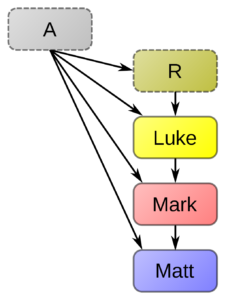Issues with Matthew
Matthew has a number of issues that calls its credibility into question. First, we look at Lukan Priority as a basis for understanding how Luke is a predecessor of Mark and Matthew is a derivative work of Mark that exhibits ad-hoc numerous changes made by Mark. Paul’s use of Luke and consistency with both Luke and Acts is another indication of Lukan Priority.
GPT.Bible Publications available on Amazon (commissions earned, affiliate partner)
Lukan Priority and the Jerusalem School
Scholars of the Jerusalem School attest that Luke is most faithful to the Hebraic source material grounding all the Synoptic Gospels. The indication is Lukan priority. The Jerusalem School of Synoptic Research is a group of “Jewish and Christian scholars collaborating in the land and language of Jesus; bringing historical, linguistic and critical expertise to bear on the synoptic gospels,” that holds to the Jerusalem school hypothesis, which is a theory against Markan priority. They provide many evidences to suggest that Luke’s version is the most accurate and that Matthew has been too often unduly influenced by Mark, even when he is correcting Mark with his parallel texts. The surprising result of this research is “that of all the Synoptists Luke should prove to be the best in the preservation of earlier texts… the fact that Luke preserves a Greek text which normally retranslates easily to Hebrew and almost always fails to give even a hint of an expression which could be interpreted as the remnant of a Markan non-Hebraism should have led me to suspect that Luke is uninfluenced by Mark and derives his usually excellent translation-text directly from a proto-source.”
The article Lukan Priority and the Jerusalem School goes into the findings of Hebraic scholars.

Marcan Priority Regarding Matthew Being a Reconstruction of Mark
The Gospel of Matthew was written after the Gospel of Mark was written. Matthew is clearly dependent on Mark for much of its content (95% of the Gospel of Mark is found within Matthew and 53% of the text is verbatim (word-for-word) from Mark). Matthew carries over some defective changes made in Mark. The Gospel is attributed to Matthew because of the presumption that some of the unique source material may had come from Matthew (a disciple of Jesus who was previously a tax collector) although most of the source material is from the Gospel of Mark as many see it is an embellishment upon Mark. What is clear is that Matthew is the combination of source materials rather than that of a single disciple or source.
Marcan Priority Regarding Matthew Being a Reconstruction of Mark documents how there are Markan Defects exhibited in Matthew. In addition to Lukan priority, the Jerusalem School has demonstrated that Matthew is a derivative work of Mark.
Matthean Posteriority & Matthew’s use of Luke
This article presents evidence for the author of Matthew having used Luke in the composition of the Gospel of Matthew. The view of Matthew being the last of the three Synoptic gospels and having a dependency on Luke is known as Matthean Posteriority. Posteriority is the state of being later or subsequent. In addition to the Jerusalem School, this view has been advocated by numerous bible scholars over the last few hundred years. Other NT scholars have recognized the merits of Matthean Posteriority. See More: Matthew’s dependence on Luke: Matthean Posteriority
Matthew is a Judaizing Document
Matthew has Judaizing features that are missing from the other gospels. Matthew makes the highest standard of the law imperative, whereas, in Luke, the law is presented as a description of the ideal. According to the Jesus of Matthew, life is entered by keeping the commandments, and perfection is emphasized corresponding to an extreme standard of righteousness. The conclusion and climax of the opening of the Sermon on the Mount, often quoted by Judaizers of Matt 5:17-20, shows especially strong evidence of redactional intrusion. See more: Matthew is a Judaizing Document
The Sermon on the Mount : The Matthean Jesus Is Not the Historical Jesus
The Matthean Jesus is not the historical Jesus. The Sermon on the Mount, in the First Gospel, is not a speech made by Jesus, but the literary work of the Evangelist who wrote Matthew. Matthew ethicizes and historizes the traditional material in light of a new situation. Regarding the emphasis of the Law in the Sermon on the Mount, these verses are largely Matthean compositions. See more: The Sermon on the Mount : The Matthean Jesus Is Not the Historical Jesus
The Many Embellishments of Matthew
The Many Embellishments of Matthew are also documented, corresponding to historical claims and significant statements that are not attested anywhere else in the New Testament.
The Origin, Authorship, and Community of Matthew
The Origin, Authorship, and Community of Matthew addresses characteristics of the author and the community through which Matthew originated
Devised Literary Structure of Matthew
The literary structure is summarized in Devised Literary Structure of Matthew.
Matthew is a Liturgical Document
Evidence that Mathew was composed for liturgical use is provided in Matthew is a Liturgical Document.
Prophecy Conflations and Misquotes of Matthew
Matthew has a number of conflations and misquotes of prophecy documented in Prophecy Conflations and Misquotes.
Corrections by Luke Over Matthew
Corrections by Luke over Matthew documents places where Luke makes a correction or clarification to Matthew.
Contradictions of Matthew
Contradictions of Matthew are those most blatantly obvious contradictions of Matthew with other Gospels.
Implications of Farrer Theory Regarding Matthew
Implications of Farrer Theory addresses how the Farrer-Goulder-Goodacre hypothesis is a basis for increase skepticism toward Matthew
Critical Scholarship of Matthew
Critical Scholarship of Matthew provides key references of critical scholarship with extensive book excerpts.
Matthew 28:19
Additionally, evidence is provided against the traditional wording of Matthew 28:19 regarding the baptismal formula, indicating it may have been added later
